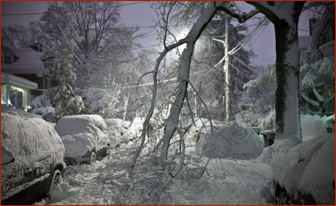
Clark Construction on the generators - the new 'normal'.
During the past few years, the northeast has experienced punishing storms causing local residents to get serious about making some arrangements to "up" their abilities to generate power during a CL&P outage. Generators, once a luxury item, have become a necessity. There's a wide range of options available, from "whole house" generators that power everything in your home to portable generators that energize a couple items in a pinch.
There are "powerful" options available: "whole house", "home standby" and "portable" generators.
Whole house generators do just that; power your entire home. They come on automatically when the power goes out, and are tied into a propane tank or a natural gas line. This has two advantages. First of all, the generator will energize itself even if you are at work or on vacation when the power goes out. This means that there will be no lapse of power to your home. Secondly, when the power is out, it is often impossible to get gasoline, since the roads may be impassable, or gas stations may be unable to pump gas once you get there. Plus frequent manual filling of a generator with gasoline grows wearisome in a long lasting power outage.
These generators are "easy", do everything, and make your life very pleasant in a power outage including running the dishwasher, and letting you use a blow dryer. They need to be wired up by a licensed electrician so that they are wired safely into your electrical panel. On the down side, they are large, require propane tanks, and a substantial up front investment.
The second category of generators are the "home standby" models. They are typically mid-sized and intended to provide power only to the most critical of circuits, ie. well and sump pumps, refrigerators, medical equipment, and a few lights. They are also tied into your home's wiring, via a transfer switch installed by an electrician. Typically, they do not come on automatically, but it's a matter of just starting the generator and flicking a switch. These standby generators are a great middle of the road option. Because they are wired into the electrical panel via a transfer switch, the risk of electricity backfeeding into the grid is eliminated.
Regardless of which you choose, once you have a generator the most important thing to do is to run it regularly, and maintain it so that it is running safely and efficiently when you need it.
Generators are awesome when the power is out, and in our area of the country, it is coming to be one of the necessities that we can't live without.
Read more on Clark Construction blog here.
Follow Clark Construction on Facebook here.